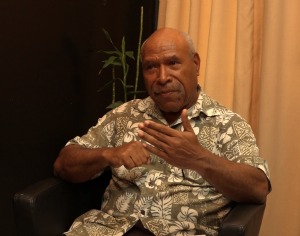By Serah Aupong – EM TV News, Port Moresby
Former NRI Director and former Lands Development Task Force Chairman said the Wewak National Court Order quashing the SABL COI report comes as no surprise.
Dr Thomas Webster said while the government say they want to help the people, they are not putting in place appropriate and efficient procedures to do so.
During his time as the NRI Director and the Chairman of the National Lands Development task force, Dr. Thomas Webster, raised issues with the government on the process they were taking to rectify the abuse of SABLs in the country.
He said when he saw that a committee comprising of the Lands, Agriculture and Forestry ministers was put in place to oversee the work of implementing the COI, he wrote a letter of protest to the Prime Minister on the grounds of conflict of interest.
On August 20th a court order by the Wewak National Court quashed the draft report and COI recommendation on the SABLs. This court order was a result of a case mounted against several entities of the state by the East Sepik Provincial Government and Limawo Holdings Limited.
Dr. Webster says this decision comes as no surprise.
“What it does is its now thrown out the whole work of the COI costing more than K15million and more than 2 years of work,” he said basically we have come back to square one.
Northern Governor, Gary Juffa who has been vocal on this issue says the government needs to take this decision to the higher court and “appeal it immediately.”
“The COI was sanctioned, initiated and funded by the government so they have a responsibility to take it to the next level,” he said.
The commission of inquiry into the SABL was the government’s response to the uproar against the widespread abuse of the special agriculture business leases.
In theory, an SABL is a way through which customary landowners will register their land if they want to use it for a particular agriculture business venture.
With the complicated nature of customary landownership in PNG, this process if done correctly, can take 5-10 years to complete. However, it was found that in less than 10 years, 5.2 million hectares of land was registered under SABLs, mostly to foreign owned business and mostly as cover ups for illegal logging.
Since the uproar against this abuse, different approaches have emerged in ensuring the customary landowner regains and maintains customary control over their land.
One the one hand, political leaders like Gary Juffa have set up independent investigations in their provinces and have been successful in holding to account those found to be in the wrong.
One the other hand institutions like the Lands Development Task force have backed the transparent registering of customary land and have helped in putting in place a new land law that helps customary land owners register their land while still maintaining control of their land.
So far with NRI as the implementing agency, they have assisted two customary landowning groups to register their land under.
These efforts happen while the Lands Department continues to struggle under constant scandals of mismanagement with the recent arrest of suspended secretary Romily Kila Pat on misappropriation of funds.
https://youtube.com/watch?v=KRcvYwA3Y6M%3Ffeature%3Doembed%26wmode%3Dopaque%26showinfo%3D0%26showsearch%3D0%26rel%3D0


